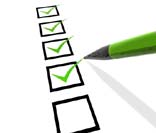What should you know about your Trade Show prospects?
 One of the most important decisions you need to make about exhibiting at a trade show is what information you should collect from your key prospects.
One of the most important decisions you need to make about exhibiting at a trade show is what information you should collect from your key prospects.
Many trade shows place barcodes on attendee badges and have scanners available for rent at a reasonable fee. This streamlines the process of building lead lists and provides a fast, unobtrusive way to gather critical information for follow-up.
When a prospect enters your booth and inquires about a product, just ask permission to scan the bar code on their badge. Then also record the products or services the person is interested in knowing more about. Most trade shows will email a spreadsheet to participating exhibitors with complete contact information and other information about the prospects.
It is a simple, effective and useful way to systematize prospect information and prioritize sales leads. And you will have almost all of the information you need to effectively follow-up on your trade show leads.
Some Exhibitors have taken data collection to a whole new level
One Fortune 500 company tracks everything imaginable about a trade show prospect using a special RFID barcode that they place on prospects when they enter their booth. They track the prospect’s path in the booth, the specific displays and demos in the booth the prospect visited, the total time spent in the booth, who accompanied the prospect to the booth and so on. Then they combine this information with registration data to create a prospect profile. In all, this company collects over 200 pieces of information about every prospect. The catch is that they didn’t have any idea what to do with most of the information they gather.
What information should you collect about prospects?
The most important part of a trade show is that it provides an opportunity to establish and build a personal relationship with each prospect. It is vital to make sure that you do not interfere with the 1-on-1 dialog with a series of questions designed to gather information. Work to make the conversation very natural and focus on the vital info.
If you can get contact information from the trade show registration, then you do not have to do anything more than scan a badge and you can focus on the critical questions and answers:
- What products or services are of interest?
- When do the buyers plan to make their purchase?
- How much does the buyer plan to spend?
- What are the most important benefits and features the buyer is looking for?
- Who is your competition and what advantages does the buyer believe the competition offers?
Does it matter if the prospect spent 8.4 minutes or 6.2 minutes in your booth? No. What matters is that you can identify the high-value prospects to sell to during the show and to contact after the show and that these prospects have a positive experience at your booth and remember your company and your staff favorably.
Take the Lead: How to Leverage Tradeshow Prospects
The number-one priority of nearly every tradeshow exhibitor is to leave that event with a high number of qualified leads that with proper follow-up can be converted into future customers. Leads replenish the sales pipeline, bring in new customers, and generate sales revenue. Efforts to do this must start by developing a strategy for gathering and qualifying leads in the early planning stages for an event.
Assess an attendee’s interest in addition to obtaining relevant information
 Representatives of your company who will be working in your booth need to know in advance what information they need to gather from each attendee to determine whether that person has the potential to buy your product or service. In order to determine that, the booth personnel need to assess an attendee’s interest in addition to obtaining other relevant information on their specific needs, budget requirements, and timing for a potential purchase.
Representatives of your company who will be working in your booth need to know in advance what information they need to gather from each attendee to determine whether that person has the potential to buy your product or service. In order to determine that, the booth personnel need to assess an attendee’s interest in addition to obtaining other relevant information on their specific needs, budget requirements, and timing for a potential purchase.
Select an automated tracking system
Automated tracking systems can also facilitate the process of capturing prospects’ contact information, though they might lack the personal contact that conveys that your company is truly interested in their needs and how it might be able to help them meet those needs. Automated tracking systems can be rented and work by electronically capturing data by having booth visitors swipe their badges as they enter the booth.
These systems vary, so do your research. Be sure the system’s output provides all the data you require for post-show marketing initiatives. Educate yourself on which equipment and software will best achieve your objectives. If automated systems can’t provide all the information you need, you might be better off opting for manual means of tracking tradeshow leads.
Know as much as possible about each sales prospect
More is better when it comes to information about potential leads. By knowing as much as possible about a sales prospect, you can devise a more effective follow-up strategy that more closely aligned with the specific needs of each person. In addition, detailed information enables you to evaluate the potential of each lead so you can prioritize your efforts. With detailed lead information, you can fine-tune your post-show marketing efforts and focus on the prospects you can most likely to convert to future customers.
Follow-up after the show is also critically important. Be sure and have booth personnel make note of how each prospect would prefer to be contacted by a company representative. After the show, contact prospects by phone, mail, or email. Be sure and follow up—either by a personal call or written contact—within a week of the show. After the show, track leads to determine each show’s effectiveness and expand efforts in shows with the best return on investment (ROI).
The Other Reasons to Exhibit at Trade Shows
Almost everything that is written regarding the justification for exhibiting at tradeshows, talks about marketing, lead generation, and sales. These are important benefits, to be sure, but here are several other very good reasons for companies to participate in shows and to make sure that they compare favorably to their competitors. For example:
 The Investment Community – Companies of all sizes, public or private, need to consider that many investment analysts attend trade shows. Where better to gauge a company’s market position relative to their industry, than at a show? Financial statements are not the only consideration when deciding on investments. Savvy institutional investors often walk the aisles of shows to better understand current positions and future potential.
The Investment Community – Companies of all sizes, public or private, need to consider that many investment analysts attend trade shows. Where better to gauge a company’s market position relative to their industry, than at a show? Financial statements are not the only consideration when deciding on investments. Savvy institutional investors often walk the aisles of shows to better understand current positions and future potential.
The Press – We have all seen shows like 60 minutes touring the Consumer Electronics Show or the Housewares Show, but these are not the only times that the press is present at shows. In every industry, people want to see what’s new. In addition, the information that is published will be posted on the internet, allowing global exposure. Favorable press coverage can really help your marketing efforts.
Recruiting – When a company comes to a show with a new or larger exhibit, prospective salespeople or managers see a financially strong, growing company, and are much more likely to consider becoming part of the team.
Market Research – When a prospect comes to your booth, why not do some market research? The key here is to formalize the information gathered by using a lead card. Asking a question like, “What would you think if we added an automatic feeder to our production system?” could provide valuable information for future product development.
While none of these reasons are going to justify the investment of exhibiting at a trade show on their own, they all add to the overall ROI. As such, be sure to consider ALL of the potential benefits when discussing the merits of exhibiting at a show.
How To Make Tradeshow Booth Leads Truly Valuable
Why are sales leads collected at tradeshow exhibits viewed as having very little real value by management and the sales staff? Why are 75% of tradeshow leads never followed up? Since most sales organizations are composed of aggressive, proactive, money motivated, commissioned sales people, it just doesn’t seem to make sense.
Gathering Sales Leads With Value at your Tradeshow
 So, what is the biggest problem with tradeshow leads? In my experience: Tradeshow leads are difficult to follow up effectively.
So, what is the biggest problem with tradeshow leads? In my experience: Tradeshow leads are difficult to follow up effectively.
If you consider the impersonal nature of taking leads at a show, it only makes sense. Attendees are given a magnetic striped card that is scanned when they come to the tradeshow display. This automatically provides an exhibitor with basic information about the prospect – name, title, company, address, email, phone etc. Most lead retrieval units also provide an opportunity to categorize the lead – “hot lead, contact immediately” or “send information only.” While this is an efficient means of collecting information at a tradeshow booth, it provides very little information to the salesperson who contacts the prospect after the show.
Your Leads are Human, not Barcodes – Custom Design your Tradeshow Lead Card
A much better way to assure effective follow-up is to design a lead card that asks a few targeted questions that will be important in post-tradeshow follow-up. When defining lead card questions, the best source of information is the people who will responsible for following up. Some ideas to consider:
- What products are you most interested in?
- Who are you currently purchasing this product from?
- What problems do you have with your current supplier?
- What could we do to earn your business?
Other helpful tips to keep in mind:
- Keep the tradeshow lead card as short as possible and consider providing the prospects with a premium item as a reward for taking time to answer your questions.
- Always swipe the attendee’s badge so that you have their basic information for follow-up.
- Energize your booth staff by offering a prize to the person who collects the most completed lead cards each day.
Try this at your next tradeshow booth and you will notice an immediate increase in results.
Need help with your trade show strategy? Let’s talk.
Archives
- July 2021
- June 2021
- May 2021
- April 2021
- October 2018
- September 2018
- August 2018
- July 2018
- June 2018
- May 2018
- April 2018
- March 2018
- February 2018
- January 2018
- December 2017
- November 2017
- October 2017
- September 2017
- August 2017
- July 2017
- June 2017
- May 2017
- April 2017
- March 2017
- February 2017
- January 2017
- December 2016
- November 2016
- October 2016
- September 2016
- August 2016
- July 2016
- June 2016
- May 2016
- April 2016
- March 2016
